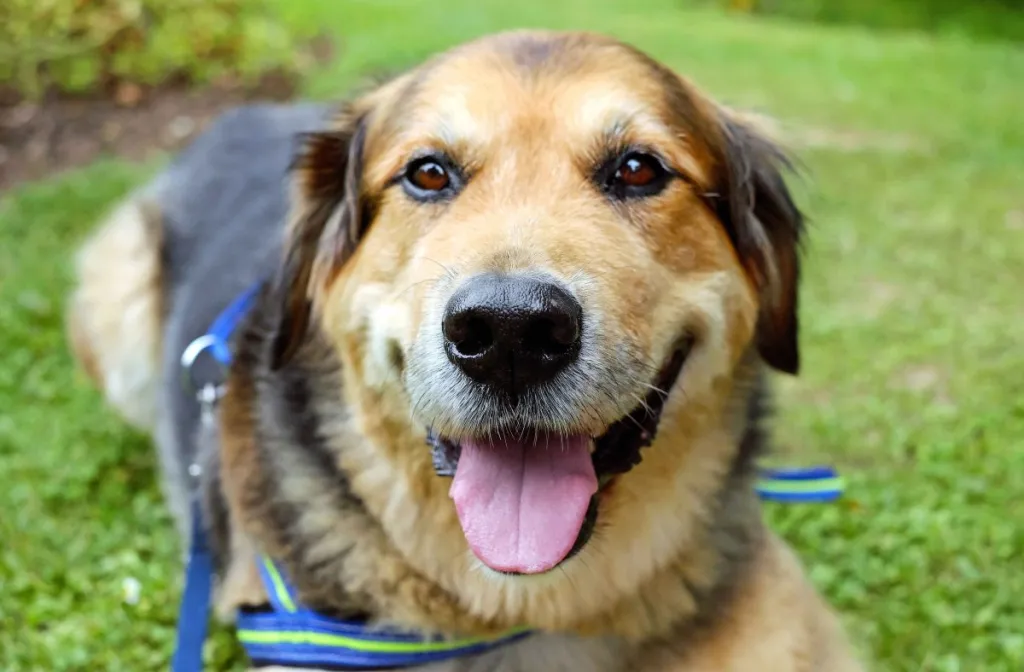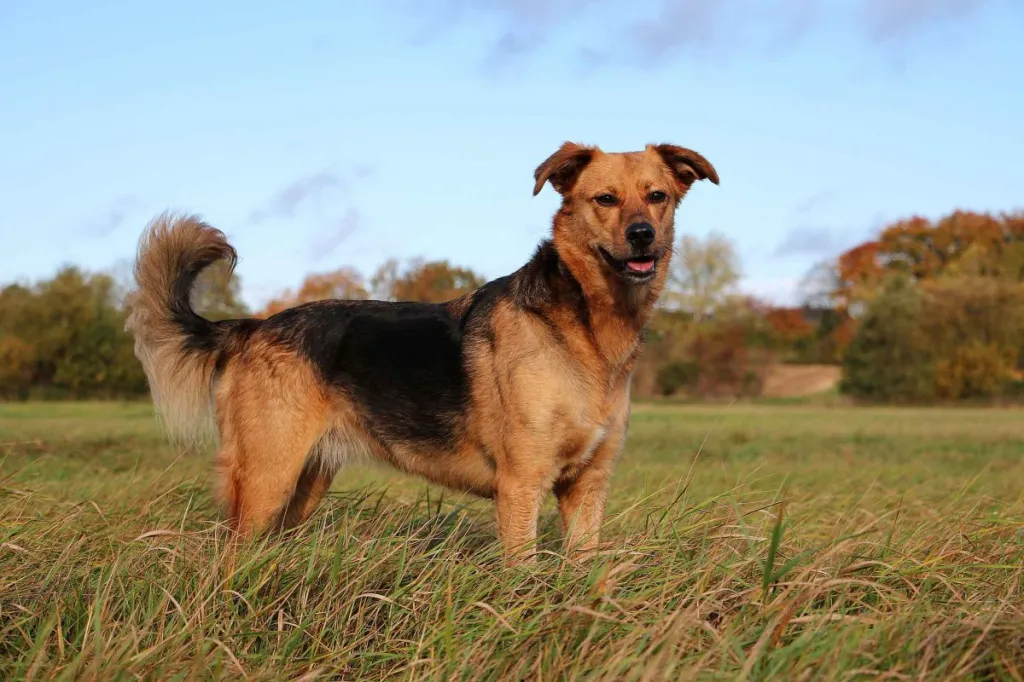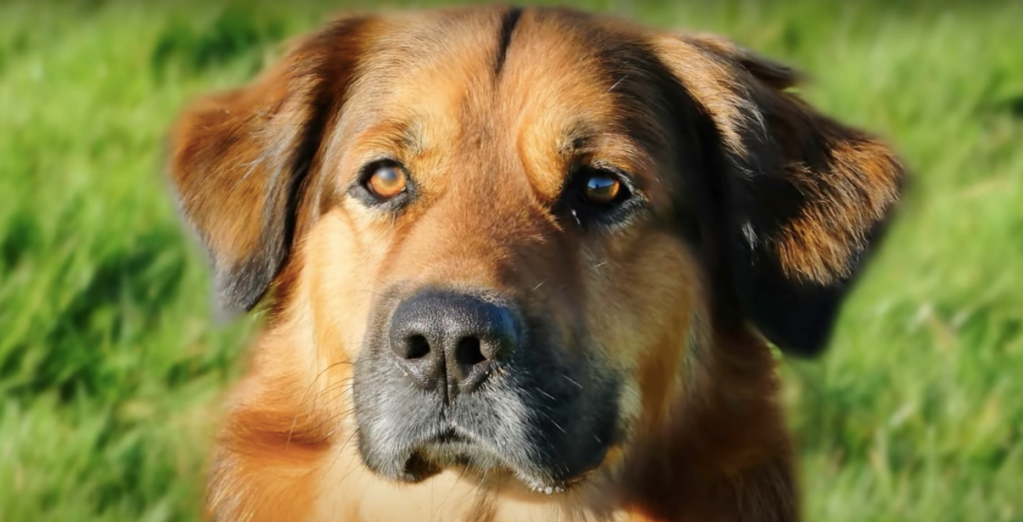The Golden Shepherd is a medium-to-large-sized cross between the Golden Retriever and German Shepherd dog breeds. Typically, this breed stands 22 to 26 inches tall at the shoulder and weighs 60 to 100 pounds. Regarding temperament, the Golden Shepherd combines both parent breeds’ intelligence, loyalty, and versatility. As a result, these dogs make excellent companions for families and individuals alike.
Furthermore, these wonderful dogs are known for being affectionate, loyal, and protective. They form strong bonds with their human family members and are often good with children. To that end, they are an ideal choice for family households. They are intelligent and trainable, excelling in various roles such as therapy work, assistance tasks, or as loving family pets. With moderate to high energy levels, the Golden Shepherd enjoys engaging in physical activities and requires regular exercise to maintain a healthy and happy lifestyle.
Golden Shepherd characteristics
- Height: 20 to 26 inches
- Weight: 55 to 85 pounds
- Lifespan: 10 to 14 years
Coat and color variations
The Golden Shepherd, a mix between a Golden Retriever and a German Shepherd, often inherits a unique blend of coat and color traits from both parent breeds. Their coat typically comes in medium to long lengths, displaying a dense, double-layered structure that provides good protection against various weather conditions. This coat can range from straight to slightly wavy and is generally soft yet durable.
The color of a Golden Shepherd varies, often incorporating shades from both parent breeds. Common color variations include golden, tan, black, and cream, with some Golden Shepherds displaying a combination of these, such as a golden base with darker markings or a sable mix. Due to the German Shepherd’s influence, some Golden Shepherds may also have a darker saddle marking on their backs, while others may lean towards the lighter, golden shades typical of Golden Retrievers.
Golden Shepherd physical traits and appearance
The Golden Shepherd is medium to large in size and combines the sturdy, athletic build of the German Shepherd with the softer, approachable features of the Golden Retriever.
Size and build
- Size: Medium to large, typically standing between 20-27 inches tall and weighing around 60-90 pounds.
- Build: Strong, muscular, and athletic; has a well-proportioned body ideal for running and agility.
Facial features
- Head: Slightly broad with a well-defined muzzle, combining the shepherd’s sharpness with the retriever’s softness.
- Eyes: Almond-shaped and expressive, usually in shades of brown, giving a warm, intelligent gaze.
- Ears: Can vary; some Golden Shepherds have floppy ears that remain down, while others may have semi-erect or fully erect ears that stand up as they mature.
- Tail: Long, bushy, and typically carried low; resembles the Golden Retriever’s tail with a bit of the German Shepherd’s thickness.
Golden Shepherd personality
Golden Shepherds make excellent family companions and watchdogs. Protective in nature, they will alert when strangers approach and may be aloof with people they aren’t family with. However, once they befriend you, you have a friend for life. Because these pups are highly intelligent and hail from a line of two working parents, they may work as therapy or service dogs. Golden Shepherds like to work and need to have a job to do, whether big or small. Give them a sense of purpose, and this dog will earn their keep tenfold. They are highly trainable and thrive on positive reinforcement. They are happiest when they have plenty of mental and physical stimulation, as their high energy levels can lead to boredom if they aren’t kept engaged.
Behavior and temperament
- Loyal and protective: Forms strong bonds and is watchful over family members.
- Friendly and sociable: Enjoys being around people and generally gets along with other pets.
- Good with children: Gentle and playful, making it a great family dog.
- Intelligent and trainable: Quick to learn and responsive to training.
- Energetic and playful: Requires regular exercise and mental engagement.
- Affectionate: Loves attention and enjoys being close to family members.
- Alert: Observant and quick to notice changes in their surroundings, making them good watchdogs.

Golden Shepherd history
The Golden Shepherd mixed breed may have existed naturally over the years, but this specific mix breed was first beginning to get attention in 2009. Breeders wanted to mix the two parent breeds to minimize health problems that affect many purebreds as well as create an ultimate family companion and watchdog. They continued to create Golden Shepherds as demand for the mixed breed pups climbed. Even though Golden Shepherds got their start as a designer breed, some have ended up in shelters or the care of rescue groups. Consider adoption if you decide this is the dog for you. Check your local shelters, look up Golden Shepherd rescues, or check with breed-specific German Shepherd and Golden Retriever rescues, as they sometimes help to re-home mixed breeds. Golden Shepherds are recognized by:
- Designer Breed Registry (DBR)
- American Canine Hybrid Club (ACHC)
- Dog Registry of America, Inc. (DRA)
- International Designer Canine Registry (IDCR)
Training and socialization
Early socialization and positive reinforcement training are crucial due to their intelligence and potential stubbornness. Of course, their intelligence allows them to pick up commands quickly, so early training is key to establishing good behavior from the start. Use praise, treats, and affection to reward desired behavior. Golden Shepherds respond well to positive reinforcement, and this approach will keep them motivated and engaged.
Training tips:
- Be Consistent: Consistency is crucial in training. Use the same commands and routines to avoid confusion. This helps your Golden Retriever German Shepherd mix understand what is expected of them.
- Keep Training Sessions Short and Fun: Golden Shepherds are intelligent but can lose interest if training sessions are too long or repetitive. Keep sessions short (10-15 minutes) and engage with varied activities.
- Mental Stimulation: Incorporate puzzle toys, obedience training, and interactive games into their routine to challenge their mind. A bored Golden Shepherd can become restless or destructive. Once basic obedience is established, teach more advanced commands or tricks. Their intelligence makes them excellent candidates for agility training, fetch, or scent games.
Golden Shepherd care
As with all dogs, it’s important to keep up your Golden Shepherd’s regular veterinary checkups to detect any health concerns early. Your vet can help you develop a care routine that will keep your dog healthy.
Golden Shepherd grooming needs
Golden Shepherds, with their double-layered coats, have moderate grooming needs that help maintain the health and appearance of their fur. Their coat sheds year-round, with heavier shedding in spring and fall, requiring regular brushing to manage loose hair and prevent matting. Because of their active nature, Golden Shepherds may also get dirt or debris in their coat, so a quick brush after outdoor activities helps keep them clean. Bathing should be done every few months or as needed to avoid stripping the coat’s natural oils. Regular ear cleaning, nail trimming, and dental care are also essential for this breed, as it helps prevent infections and maintain overall health.
How to groom a Golden Shepherd
- Brushing: Brush at least twice a week, and daily during shedding seasons, using a slicker brush or de-shedding tool to remove loose undercoat.
- Bathing: Bathe every 2-3 months or when needed, using a mild dog shampoo; avoid over-bathing to prevent dry skin.
- Ear Care: Clean ears weekly to prevent buildup and check for redness or signs of infection, especially if ears are floppy.
- Nail Trimming: Trim nails every 3-4 weeks or as needed to avoid overgrowth and discomfort.
- Dental Care: Brush teeth several times a week, ideally daily, to prevent plaque buildup and maintain oral health.

Flea, tick, and parasite control
Keep up with flea and tick prevention treatments, especially if your Golden Shepherd spends much time outdoors. Regular grooming allows you to spot parasites early.
Early acclimation is key
Getting your Golden Shepherd accustomed to grooming procedures from a young age makes the process easier and more enjoyable for both of you. Handle their paws frequently, examine their mouth and ears, and reward them for good behavior during grooming sessions. This positive foundation sets the stage for stress-free veterinary exams and handling throughout their lives.
How much exercise does a Golden Shepherd need?
A couple of walks every day, totaling around 45 minutes, should do the trick to keep your Golden Shepherd happy and healthy. However, due to their remarkable intelligence, it’s of great benefit to incorporate obedience tasks into the exercise mix to keep them interested and mentally stimulated.
Feeding and nutrition
An ideal Golden Shepherd diet should be formulated for a medium to large breed with medium energy. They should stick to a healthy diet, as overeating can cause weight gain and associated health problems, especially if adequate exercise isn’t offered.
As with all dogs, the Golden Shepherd’s dietary needs will change from puppyhood to adulthood and will continue to change into their senior years. You should ask your veterinarian for recommendations about your Bordoodle’s diet, as there is far too much variation among individual dogs–including weight, energy, and health–to make a specific recommendation.
- Adult Portions: Feed an adult Golden Shepherd based on their weight, size, and activity level. On average, a medium-sized adult (40-50 lbs) Borderdoodle will need about 2-3 cups of dry food per day. A larger dog (50-60 lbs or more) may need 3-4 cups per day.
- Adjust According to Activity Level: Highly active Golden Shepherds may need more food than less active ones. Always monitor their weight and adjust portions accordingly.
Golden Shepherd family compatibility
Golden Shepherds are highly compatible with families due to their affectionate, loyal, and protective nature. They tend to bond closely with all family members, making them excellent companions, especially for children. This breed is generally gentle and patient with kids, often showing a playful side that makes them a great match for active families. Golden Shepherds are also known for their social and adaptable personality, allowing them to get along well with other pets when properly introduced and socialized. Their protective instincts make them naturally inclined to watch over the household, while their friendly temperament means they are welcoming to family friends, and visitors. However, Golden Shepherds thrive best in families that can provide them with plenty of exercise, mental stimulation, and attention.
Do Golden Shepherds get along with other pets?
Yes, Golden Shepherds typically get along well with other pets, especially when they are properly socialized from a young age. They inherit the social and friendly traits of the Golden Retriever, which makes them open to bonding with other dogs and even cats. Their loyalty and intelligence, drawn from both parent breeds, help them understand social cues and adjust their behavior around other animals.
However, Golden Shepherds also have a protective instinct from their German Shepherd side, so early socialization and consistent, positive introductions to other pets are essential. With the right training, they can coexist harmoniously with other animals in the household, making them a good choice for multi-pet families.
Golden Shepherd health issues
The Golden Shepherd mixed breed is predisposed to some of the same conditions that the German Shepherd and Golden Retriever also face. Some of the more common health problems Golden Shepherds suffer from include:
- Hip Dysplasia: Hip dysplasia is a heritable condition in which the thighbone doesn’t fit snugly into the hip joint. Some dogs show pain and lameness on one or both rear legs, but you may not notice any signs of discomfort in a dog with hip dysplasia. As the dog ages, arthritis can develop. X-ray screening for hip dysplasia is done by the Orthopedic Foundation for Animals or the University of Pennsylvania Hip Improvement Program. If you’re buying a puppy, ask the breeder for proof that the parents have been tested for hip dysplasia and are free of problems.
- Cataracts: As in humans, canine cataracts are characterized by cloudy spots on the eye lens that can grow over time. They may develop at any age and often don’t impair vision, although some cases cause severe vision loss.
- Gastric Dilatation-Volvulus: Commonly called bloat, this is a life-threatening condition that affects large, deep-chested dogs like Golden Retrievers, especially if they’re fed one large meal a day, eat rapidly, or drink large amounts of water or exercise vigorously after eating. Bloat occurs when the stomach is distended with gas or air and then twists. The dog is unable to belch or vomit to rid himself of the excess air in his stomach, and blood flow to the heart is impeded. Blood pressure drops and the dog goes into shock. Without immediate medical attention, the dog can die. Suspect bloat if your dog has a distended abdomen, is drooling excessively, and retching without throwing up. He also may be restless, depressed, lethargic, and weak with a rapid heart rate. If you notice these symptoms, get your dog to the vet as soon as possible.

Golden Shepherd rescue groups
It may be hard to find a breed-specific rescue for Golden Shepherds because they are a mixed breed. However, you may want to try German Shepherd Dog or Golden Retriever breed-specific rescues, as they often care for mixes, as well. Here are some rescues you can try:
- German Shepherd Rescue of Orange County
- Golden Retriever Rescue of Atlanta
- As Good as Gold Rescue
- Retriever Rescue of Las Vegas
- Coastal K9 German Shepherd Rescue
- Sedona Shepherd Sanctuary
- German Shepherd Dog Rescue of Georgia
- Mid-Atlantic German Shepherd Rescue
If you choose to purchase a Golde Shepherd puppy, finding a reputable breeder is incredibly important. Reputable breeders are committed to breeding healthy, well-socialized puppies that will make great companions. They will screen their breeding stock for health problems, socialize their puppies from a young age, and provide you with lifetime support.
On the other hand, backyard breeders are more interested in making a profit than in producing healthy, well-adjusted dogs. They may not screen their breeding stock for health problems, and they may not socialize their puppies properly. As a result, puppies from backyard breeders are more likely to have both health and behavioral issues.












